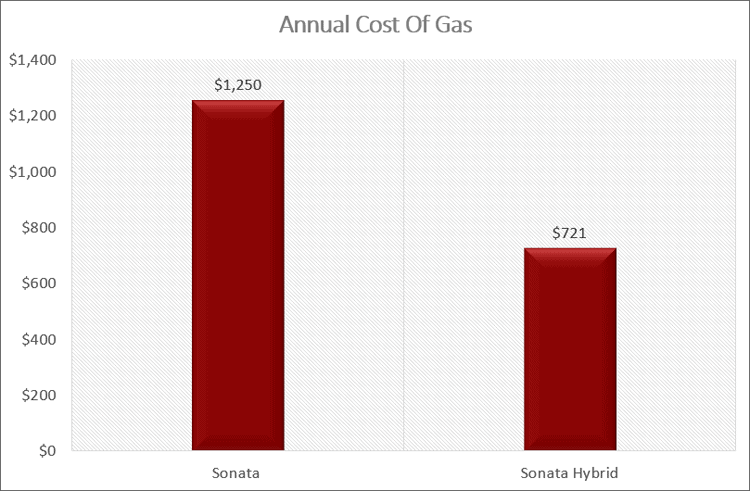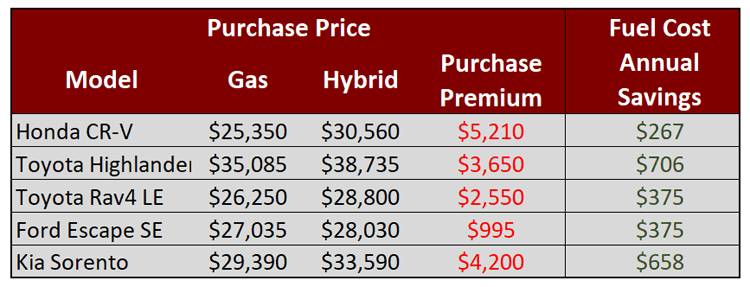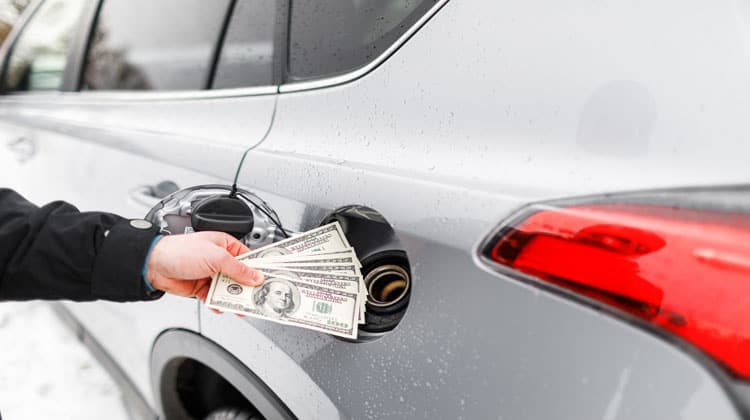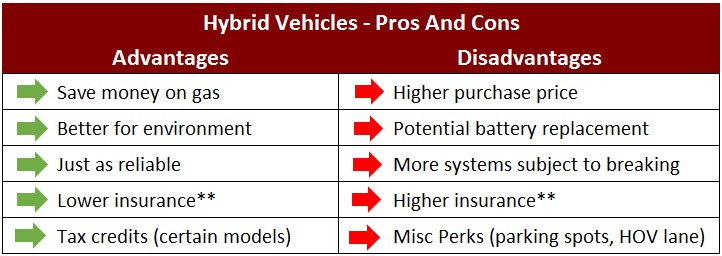THIS POST MAY CONTAIN AFFILIATE LINKS. PLEASE SEE MY DISCLOSURES. FOR MORE INFORMATION.

If you are looking to buy a hybrid car thinking it will help you to save money, you better think again.
For many people wondering if hybrid cars are worth it, the answer is probably not.
The reality is that in most cases, hybrid cars end up costing you more money than buying a gas powered car.
So then why do so many people buy a hybrid thinking it will save them money?
It is because most people only focus on the cost of gas as a reason for buying a hybrid car.
And this makes sense.
Each week you head over to the gas station to fill up your tank.
Depending on the price of gas, you are looking at a cost of around $40 or more to fill up every week.
To relieve this pain at the pump, we focus on solutions to avoid the gas station.
The solution that pops into your mind is to buy a more fuel efficient car, namely a hybrid car.
Better fuel efficiency means fewer trips to the gas station, which means you save money.
It’s a win-win-win.
If only it were that simple.
The truth is, gas is only one part of the picture when it comes to saving money on your car.
Do Hybrid Cars Save You Money? The Complete Picture

To see whether hybrid cars save you money, you have to look at the complete picture.
This means you need to look at the following:
- Purchase price
- Reliability/On going costs
- Gas savings
- Ownership savings
- Purchase incentives
Once you look at each of these, you will get a much clearer picture of whether you should buy a hybrid car.
Let’s go through these topics in detail.
Hybrid Purchase Price

The first thing you need to look at when determining if a hybrid will save you money is the cost of buying the car.
Often new hybrid cars are more expensive than regular cars.
According to the most recent numbers, the average price of a hybrid is $4,650 more than a car with a conventional engine.
This is because they cost more to build. The manufacturer then passes that added cost on to the buyer.
For example, look at the cost of a 2021 Hyundai Sonata. The base price for the SEL model is $25,800.
The same car as a hybrid costs $29,900.
So right off the bat, a hybrid isn’t saving you any money. It is costing you more money.
In this example, it is costing you $4,100 more to buy. Note that I will talk about tax credits shortly.
While the general rule is that a hybrid car is more expensive, the price difference will vary depending on the cars you are comparing.
But this is only part of the picture of whether hybrids are worth it, so let’s move on to reliability.
Hybrid Car Reliability
Since I am comparing the same make and model vehicle, the reliability for both should be similar.
Therefore, there isn’t any major savings by choosing one over the other.
Overall, hybrid cars are just as reliable as gas powered cars.
You shouldn’t expect it to cost you a lot more in terms of routine maintenance.
But there are some differences.
For starters, a hybrid uses regenerative braking to charge the battery.
This means brake pads on hybrids tend to last longer compared to gas only cars.
Again, this isn’t a huge savings, but is worth noting.
Another difference is the cost of insurance.
There are some insurance companies that offer discounted rates to owners of hybrid vehicles.
This is because typical hybrid drivers aren’t known to be aggressive drivers and speed.
By being seen as a safe driver, you can get discounts on insurance.
With that being said, some insurance companies charge more to hybrid owners.
This is because they see a costlier car in terms of repair.
Not only do they have to cover the traditional internal combustion engine, but also the hybrid system too.
Your best bet here is to ask your insurance carrier what the annual premium would be and then compare that to another insurance company.
Insurify is the best option for comparing auto insurance rates.
You get multiple quotes in seconds and they will make the switch for you.
Average users save over $500 a year on car insurance!
Click the link below to see how much you will save.
Get Multiple Insurance Quotes
Insurify
With Insurify, you get multiple insurance quotes, fast and easy. The average savings is close to $500 a year. Click the link below to see how much money you will save with Insurify!
The other major concern with hybrid car reliability is the hybrid battery.
Many people think a hybrid battery replacement will cost tens of thousands of dollars.
They also believe the battery will only last a certain length of time or number of miles.
The truth is car manufactures build hybrid car batteries to last the life of the vehicle.
And many car manufactures offer standard warranties on hybrid batteries that last up to 10 years and cover 100,000 miles.
This is much longer than a traditional warranty on a gas powered car.
There are even stories of hybrid taxi cars whose batteries last more than 300,000 miles!
The truth is, replacing a hybrid battery is rare.
And when it does happen, the cost to replace one is typically $5,000 or less.
Therefore, you shouldn’t worry about needing to replace the hybrid battery as more often than not, you will never have an issue.
An if you think that is expensive, it is equivalent of replacing a rear differential in a gas powered AWD Volvo SUV.
When comparing the same make and model, the reliability issue is not a major factor in terms of price.
Now if you were comparing a gas powered Audi and a hybrid Ford, then you would dig into how long the car typically lasts as well as the price for repairs to see which one is a better deal.
This is because cars from different manufacturers will have different maintenance costs and reliability estimates.
But at the end of the day, maintenance for hybrids doesn’t tend to have higher costs compared to traditional cars.
Gas Savings
Now we get back to the cost of gas.
This is where hybrids shine, using less fuel to operate.
To determine if there are any savings here, you need to look at the cost of gas and the number of miles you drive your car.
We will assume that the price of a gallon of gas is $2.50 for regular and that you drive 15,000 miles per year.
The gas powered Sonata averages 30 miles per gallon combined. The hybrid version averages 52 miles per gallon combined.
The formula to figure out your annual cost of gas is to take annual miles driven multiplied by the cost of a gallon of gas.
You then divide this by the average miles per gallon.
For the gas powered Sonata, the formula is this: 15,000 (miles driven) x $2.50 (price of gas). This gets us 37,500. We divide this by 30 (average mpg) and the answer is $1,250.
We will spend $1,250 per year in gas with this car.
With the hybrid, the annual gas cost is $721.
Over the course of a year, the hybrid will save you $529 in gas.

Sadly, while this gives us a rough idea of the cost of filling up our gas tank, it is not 100% accurate.
This is for two reasons.
The first reason is that the price of gas fluctuates.
If the price of gas rises, the savings for the hybrid car will be greater. If gas prices fall, the savings go away.
For example, let’s use the same example as above but assume gas costs $3.50 a gallon.
The gas powered Sonata will cost $1,750 in annual fill ups.
The hybrid will cost $1,110.
The hybrid saves you $640.
As gas prices increase, hybrids will save you more money on gas.

For example, when gas is $5.00 a gallon, the hybrid Sonata will save you roughly $1,050 a year in gas.
But at $2.50 a gallon, the savings drop to roughly $500.
The second reason is your commute.
I took the average combined miles per gallon in my example.
If you live in the city, you will want to focus more on the city mileage rating.
If you drive mostly on highways, then focus more on the highway mileage rating.
Also, the number of miles you drive each year has a major impact on your comparison.
The more you drive, the sooner you will see savings by going with a hybrid.
The less you drive, the longer it will take to see any meaningful savings.
If you take short distances, you could save more money as well since the car will be running more on battery power.
Again, let’s assume fuel prices are $3.50 a gallon and you drive 20,000 miles a year.
The gas version costs you $2,333 a year in gas.
The hybrid will cost you $1,346 a year in gas.
Your fuel savings from buying a hybrid is $987 a year.
Finally, there is one more thing that it critical to know about hybrids and gas savings.
This is something I rarely hear anyone talk about.
When the temperature drops below 35 degrees, hybrids see a reduction in miles per gallon.
It is not uncommon to notice a 35% reduction in fuel efficiency in cold weather.
This means if you routinely get 41 miles per gallon, when cold weather hits, you will experience roughly 27 miles per gallon.
The gas powered version will see a 20% decrease in fuel efficiency in cold weather.
This means a drop from 28 miles per gallon down to 22 miles per gallon.
Therefore, if you live in cold climates, buying a hybrid may not make sense for this reason alone.
Just know as a general rule, hybrids save you money when it comes to paying for gas.
But just like the difference in purchase price, spending money on gas is only part of the picture.
Purchase Incentives

The next thing to consider when determining if a hybrid car is worth it is if there are any incentives.
This is critical as we have seen the initial costs of buying a hybrid tends to be higher.
There are a few levels of incentives to look at.
The first is with the dealer.
Many times dealers will offer cash back or rebates on various models.
As of this writing, there are no purchase incentives on the Sonata.
In the past, the offer was $2,000 cash back on the gas powered Sonata. On the hybrid, the cash back was $2,500.
Since there are no cash back incentives, the price of the gas powered Sonata would be $25,800 while the hybrid Sonata would be $29,900.
This means the hybrid version costs an additional $4,100.
The next area to look at is government tax credits.
In years past, the government offered any type of hybrid car a tax credit.
But this is no longer the case.
The current tax law for hybrid cars allows for a credit when you buy an electric or plug-in hybrid vehicle.
These tax incentives are anywhere from $2,500 up to $7,500.
Here is a great reference to review.
Since the Sonata hybrid in this scenario isn’t a plug-in, there is no government tax credit.
Some states also offer a tax credit, as do some utility companies.
Again, most offer these credits are on plug-in hybrids and pure electric vehicles only, but make sure you check to see if you qualify.
Ownership Savings
The last area to look at is ownership savings.
This area has little to do with money and more to do with other types of savings.
For example:
- With a hybrid car, you will save time by not having to run to the gas station as frequently.
- With a hybrid car, you could drive in the HOV lane, escaping traffic, saving time, and avoiding stress.
- You help save the environment as you have a smaller carbon footprint with a hybrid vehicle.
- Some companies allow hybrid owners special parking spots and other company perks.
You will have to determine what, if any, of these factors play a role in owning a hybrid car.
While you can’t put a monetary value on them, you will have to decide if not running to the gas station as frequently will improve your life and if that happiness is worth it.
For example, if saving the 15 minutes by not going to the gas station as often is a major win for you, is it worth paying an extra $4,000 for a car?
The Complete Hybrid Picture
Now that we know what to take into account, is buying a hybrid worth it?
Let’s look at the Hyundai in detail over a 10 year period.

We know that the Sonata hybrid initially costs more and there are no current incentives from the manufacturer.
There are no extra savings in the form of government hybrid car tax credits either.
So out the door, buying a hybrid puts us in the hole by $4,100.
When looking at the cost of gas, we see that the hybrid will save us money.
But it is only saving us $529 each year.

When we take into account the higher purchase price, we find that we have to drive the car close to 6 years to have the gas savings get us back to net zero!
In other words, after 5 years of owning the hybrid, we will have spent more money buying the hybrid than if we just bought the gas powered version instead.
It won’t be until year 6 that we start saving money with the hybrid car!
Here is an annual break down of the cost to own over 10 years.

If you tend to only keep your car for 6 years, which is the average length of time consumers keep their cars, you are going to spend over $2,000 more buying a hybrid than you would buying the gas powered version.
But there is one caveat here.
And it is all the other savings you get from owning a hybrid car.
You have to determine how much better your life will be not visiting the gas station each week.
You have to determine how much you care about the environment.
If these monetary and non-monetary savings are worth it for you, then owning a hybrid car can make sense.
But if you are only trying to save the most money possible, you are better off buying a gas powered car instead that has good gas consumption.
This is because of how long it will take you to actually begin saving money with a hybrid.
And as car manufacturers meet new fuel efficiency guidelines, gas powered cars are going to get better gas mileage.
For example, the 2019 Sonata averaged 28 miles per gallon. Now it is up to 30.
This will only continue to erode the potential savings from fewer fill ups you get from a hybrid.
Finally, while I am looking at the cost of new cars, know that used hybrids command a higher resale price as well.
This means you might not come out ahead with a hybrid buying used either.
So this leaves us with two unanswered questions.
- If you think a hybrid is worth it, which ones are the best value?
- If your ultimate goal is to save money, especially on gas, but you don’t think a hybrid is worth it, what do you do?
Below are the answers to both of these questions.
Which Hybrids Are The Best Value?
If you run through this guide and feel that based on your numbers and other factors that a hybrid makes sense for you, what are the best hybrid vehicles to buy?
In no particular order, here are the best hybrid models that get you the most for your money.
Best Hybrid Cars
- Toyota Corolla LE Hybrid
- Toyota Camry LE Hybrid
- Honda Accord LX Hybrid
- Hyundai Elantra Hybrid
Best Hybrid SUVs
- Honda CR-V
- Toyota RAV4 Hybrid
- Toyota Highlander Hybrid
- Ford Escape SE Hybrid
- Kia Sorento
Below are charts breaking out years of ownership.


First, you can see how much more expensive buying a hybrid is compared to the gas powered version of the same car.
In most cases, you are looking at between $2,000 and $4,000 premium.
The exception to this is the Ford Escape, which is less than $1,000 more expensive.
Next, you will see how much money you will save in annual fuel costs by owning the hybrid version.
These numbers assume you drive 15,000 miles a year and pay $3.00 for a gallon of gas.
Based on these numbers, you can expect to save anywhere from $200 up to $700 a year in gas.
Now that we have this information, we need to look at owning the hybrid over the long term.
Below is a chart doing this.


The green numbers show you how much money you are saving by purchasing a hybrid car and red numbers show you how much you are losing by opting for a hybrid.
For example, let’s look at the Toyota Corolla.
Taking into account the purchase premium of the hybrid and the annual gas savings, after 5 years of ownership, you end up paying $634 more for the hybrid.
After 6 years, you are paying $135 more for the hybrid.
Finally in year 7 of owning the car, you are truly saving money by opting for the hybrid version.
In other words, if you only keep your car 5 or 6 years, buying the hybrid Corolla is not a smart financial decision.
On the other hand, let’s look at the Honda Accord.
After 5 years of owning the hybrid, you are already saving $531! If you own the car for 10 years, you saved yourself $2,661.
This is a smart financial decision if you keep your cars this long.
The interesting this about this however, is how the savings has been declining.
Every year I update this post with current vehicle information.
Just 2 years ago, opting for the Accord Hybrid saved you close to $1,000 after 5 years and over $3,500 after 10 years.
But because conventional engines are getting more efficient, the fuel savings is eroding. But the purchase premium is not.
And seeing how this analysis is factoring in 15,000 annual miles, you should be able to keep driving the Accord for much longer than 10 years.
These vehicles in the chart are the best hybrid values because the purchase premium of the hybrid is low enough that you will save money much sooner than with most other hybrids.
But again, I encourage you to run your own numbers so that you can make the best decision for your wallet and your tastes.
To determine these numbers, I used purchase price and fuel economy to take into account versus gas powered alternatives.
I did not take into account incentives since these change all of the time and would skew the results.
For example, I could have taken into account the current incentive on the Honda CR-V.
This incentive would make the hybrid version a decent option.
But if that incentive goes away, the Honda CR-V Hybrid is not a good value.
I also assumed that the maintenance costs are the same between the gas powered version and the hybrid version.
Of course, not on this list are hybrids that don’t have a gas powered alternative like the Prius.
Also not on this list are plug in hybrids/electric vehicles.
This is because almost always, they are good values.
But the best values here are the following vehicles:
- Toyota Prius
- Kia Niro Plug-in
- Subaru Crosstrek Plug-in
- Chrysler Pacifica Hybrid
Since the purchase price of a hybrid is what makes or breaks any savings, it is critical to get this number as low as you can.
I wrote an article on how to save the most money buying a car that will help you with this critical step.
In the event you don’t want to read the entire post, make sure you use Edmunds.com to research car prices so you ensure you don’t over pay.
I love using Edmunds because this site lets you get personalized price alerts and specialized car buying experts.
You can learn clicking the link below.

At the end of the day, it is critical you look at the different models yourself and not rely on the chart above.
The reason for this is because incentives change regularly, which has an impact on the overall numbers.
Also, this list was put together using an average gas price of $3 per gallon.
As I mentioned earlier, the higher the cost of gas, the more savings you will experience with the hybrid.
How To Save The Most Money On Gas

If after reading through this guide you realize that a hybrid car is not worth it to you but you really want to save money on gas and get better mileage, I have some simple solutions for you.
#1. Learn The Ideal Way To Drive
Speeding up quickly after a red light or applying the brakes hard destroys your gas mileage and costs you with added wear and tear on your car.
Learn to anticipate red lights by allowing your car to coast to a stop.
When stepping on the gas after the light turns green, apply light pressure to the pedal and slowly increase your speed.
Driving fast also has an impact on your gas mileage.
For every 5 mph over 60 mph that you drive, you are paying an additional 27 cents per gallon on gas.
Using an example, let’s say you drive at 75 mph. That is 15 mph over 60 meaning you are paying an additional 81 cents per gallon. That is huge!
When you get on the highway, just set your cruise control for 65 mph, save money on gas and forget about everyone else.
#2. Reduce Weight As Much As Possible
There is a law of physics that says force equals mass times acceleration. Your car consumes more gas when it needs more force.
And it needs more force when there is added weight.
So take an hour this weekend and clean out your trunk and back seat of everything you don’t need.
Doing so will instantly improve your gas mileage.
#3. Pay With Cash
More and more gas stations offer a discount on gas when you pay with cash.
This discount can amount to $0.05 or more per gallon.
Before you fill up, be sure to ask if they offer a cash discount.
#4. Use A Cash Back Credit Card
If paying in cash is too much trouble for you, there is another option.
You can use a cash back credit card.
The one I use gets me a 3% reward. So for every dollar I spend on gas, I save $0.03.
You can click the link below to find the best card to use on gas purchases.

#5. Use An App
I love using the GetUpside App.
It gives me a discount on every gallon of gas I buy at participating gas stations.
Plus, when my friends sign up using my referral code, I get additional discounts.
You can click here to learn more about this gas hack or click the link below to get the app.

#5. Be Smart And Pay Attention
When you are running errands, be on the lookout for gas stations to see who has the best prices.
You can also use free apps on your phone to help with this.
Then make it a point to fill up when you are near these stations.
Also, when traveling, know that gas stations near the highway exits tend to charge more for gas.
Take an extra 10 minutes and drive into town for a lower price on gas.
Plug In Electric Vehicles

This post about hybrid cars would not be complete without talking about plug in hybrids.
While most of the data I shared above is true with a plug in hybrid as well, you have to take into account electricity and how that factors into your savings.
In most cases, buying a plug in hybrid is a smart financial choice.
This is for two reasons.
First, there is the federal tax credit of up to $7,500.
In many instances, this credit can make the purchase price between a plug in hybrid and a gas powered car identical.
For example, the Chrysler Pacifica Plug In Hybrid has a price of $40,295. The gas powered version costs $35,495.
This is a difference of $4,800.
In addition to this tax credit, many state and local governments and your utility company may off credits or rebates as well.
Second is the cost of electricity.
You may have to add an electric outlet in your garage or onto the side of your house to charge the car. You can use a standard 120 volt outlet or a 220 volt outlet. The cost to install an outlet is a one time charge of up to $500.
But we have to talk about the cost of electric power. For example, assume electric costs $0.11 per KW hour.
If you have a standard 120 volt outlet, it will take 9 hours to fully charge the battery in a Sonata. This means it will cost you $0.99.
If you have a 220 volt outlet, it will take you 3 hours to charge the battery. This means it will cost you $0.33.
A fully charged battery will allow you to drive up to 27 miles on electric alone.
Therefore, if you drive 25 miles every day and charge the car every night for 9 hours, it is costing you $1.00 a day or $365 a year to operate.
Of course this doesn’t take into account days when you travel longer distances and need to fill up with gas.
But the idea is by choosing a plug in hybrid, you will save money compared to a gas powered car.
Frequently Asked Questions

This post takes a deep look at answering the question of are hybrid cars worth it.
Because you might be limited on time, I created this section for you to quickly skim through to get the answers to your biggest questions when it comes to hybrid cars.
What kinds of hybrid cars are there?
Most people lump hybrid cars into one single category.
But the reality is there are 4 different types of hybrids vehicles for sale.
Here are the different kinds you will come across.
Parallel Hybrid Cars: This is the most common type of hybrid vehicle you will see. Regular hybrids use a combination of an electric motor and a gasoline engine to move the vehicle.
Mild Hybrid Cars: These are also called micro hybrid and light hybrid as well. These cars have a battery to give a boost to the gas engine as will as improve fuel efficiency. Many cars today are sold in this configuration, but they don’t offer much in terms of savings.
Plug-in Hybrid Cars: Called PHEV cars for short, these are a combination of electric vehicle and a hybrid. You have to plug these vehicles into an electrical outlet to charge them. Some of these also have a gasoline engine as well to increase the range on longer drives.
Series Hybrid Cars: Also known as Range Extended Hybrids, these cars are powered by the battery pack and use gasoline to recharge the battery so the driver can continue to drive. You have to plug these vehicles in as well.
Are hybrids expensive to repair?
It all depends on what needs to be repaired. In most cases, hybrids are not more expensive to repair compared to a conventional car.
However, if there is a major issue with the hybrid system, then you will be looking at a costly repair bill.
At the end of the day, you have 2 major components powering a hybrid car. The internal combustion engine and the hybrid battery system.
On traditional cars, you only have one major component, the internal combustion engine.
Therefore, the odds of something major going wrong with a hybrid are greater, simply because there are two systems that power the car.
With that said, if you buy from a reliable manufacturer, you shouldn’t expect to have higher repair bills.
Are hybrids expensive to maintain?
Hybrids are not more expensive to maintain.
They get their oil changed just like traditional cars do at the same set intervals and you have the same intervals for routine maintenance.
In fact, in some cases a hybrid is less costly to maintain.
For example, hybrids use the brakes to regenerate the battery.
As a result, brakes tend to last longer in hybrids than in traditional cars.
Are hybrids reliable?
Yes hybrid cars are reliable. In fact, hybrids are just as reliable as gas powered cars.
While there is a myth that the hybrid battery will eventually die and leave you stranded, the truth is this is very rare.
Most car manufacturers offer a warranty on the battery that is longer than the warranty on the gas engine and related powertrain.
Some car manufacturers even warranty the hybrid battery for life.
Are there any problems with hybrid cars?
There is only one problem with hybrid cars. I consider it a problem because no one talks about it.
The problem is that you will not get the advertised miles per gallon when the temperature drops below 35 degrees.
When the outside temperature is below 35 degrees, you can expect a drop of 35%.
This means if you are getting 49 miles per gallon in warmer weather, in very cold weather you can expect 32 miles per gallon.
This is still decent fuel consumption, but nowhere near what many hybrid buyers expect.
What are the pros and cons of hybrid cars?
Below is a chart going over the advantage and disadvantage of hybrid cars.
They are in no order, so you have to determine which ones matter the most to you.

For example, for some reading this, being eco-friendly might be the biggest advantage of owning a hybrid.
For someone else, the potential for lower ownership costs might be the biggest advantage.
Just be sure that you don’t make the mistake of over-hyping the pros of owning a hybrid and dismissing the cons.
What is the resale value of hybrid cars?
Since hybrids are in demand, they tend to have a higher resale value than traditional gas powered cars.
Of course as with any car you are selling, you will get the most money for your car when you sell it privately versus trading it in.
Are hybrids more expensive to insure?
This varies by insurer.
On the one hand, some insurers will give lower premiums to hybrid car owners since the typical driver does not speed and is a safe driver.
On the other hand, some insurers charge higher premiums on hybrid cars because there is more things that can potentially break.
Not only do you have a gas powered engine, but you also have an entire hybrid system that runs off of a battery.
Your best option is to get an insurance quote form your current insurer before you buy a hybrid.
Then get a second quote from Insurify just to ensure you aren’t being overcharged by your current insurer.
Get Multiple Insurance Quotes
Insurify
With Insurify, you get multiple insurance quotes, fast and easy. The average savings is close to $500 a year. Click the link below to see how much money you will save with Insurify!
Does it make sense to buy a used hybrid?
It can make sense to buy a used hybrid.
When you buy used, you save money as the car has already taken the initial depreciation hit.
However, you do want to understand the warranty the car has. Is there a warranty on the hybrid system? If so, is it transferrable to a new owner?
Is it smart to buy diesel cars?
For a few years before hybrid technology became mainstream, the diesel engine was a great option for improved fuel efficiency.
However, because hybrids have come so far so fast and the environmental impact diesel has, many car manufacturers have begun to phase out diesel engines in favor of hybrid and electric motors.
What Is The Best Hybrid Crossover?
The best on the list is the Toyota RAV4 Hybrid.
Not only is the purchase right so that you are actually saving money early on, but with the reliability of Toyota, you know you won’t be servicing the vehicle very much.
What Is The Best Hybrid Hatchback?
It should come as no surprise that the Toyota Prius is tops for hatchback hybrid.
It has a long history of reliability and offers many options to fit your needs exactly.
If you are looking for a smaller hatchback, consider the Chevrolet Bolt.
Should I Buy A Hybrid?
This is a personal decision.
If your main goal is to save money, you need to do the math to determine the break even point between the higher purchase price and the lower fuel expense.
For many hybrids, this point is anywhere from 5 years or longer.
So if you only plan to keep the care 3 years, chances are you won’t save any money.
If money isn’t a factor and you are just looking to make a smaller carbon footprint to help the environment, then you need to consider the environmental impact of getting the materials for the hybrid vs. the impact of fossil fuels.
The bottom line is, there is no simple yes or no answer here.
You have to decide what is most important to you and if a hybrid meets those needs by doing your own research.
Final Thoughts
At the end of the day, if you want to save money on gas, buying a hybrid car is not worth it.
You will not see a meaningful savings because of the other factors associated with buying and maintaining the car.
The biggest one being that most consumers get rid of a car after just 6 years.
While you may intend to keep your car longer, know that it isn’t always in your control.
You might get into an accident and total your car. Or you might have a major mechanical failure after the warranty expires making it not worth repairing.
But if you have other reasons for wanting a hybrid, like wanting to save the environment, then you can justify the higher initial purchase price and potential of not saving much money by owning a hybrid vehicle.
The goal of this post isn’t to be anti-hybrid.
The goal is to make you think about money over the long term.
As I noted, there are some great hybrids and pure electric cars out there that do save you money much sooner than the example I provided.
But there are also many others that will not save you money if that is your ultimate goal.
Too many times we make money decisions based on the short term and they end up costing us more in the long run.
Learn to look long term with your money and you will make smarter financial decisions that will have a positive impact on your well-being.

